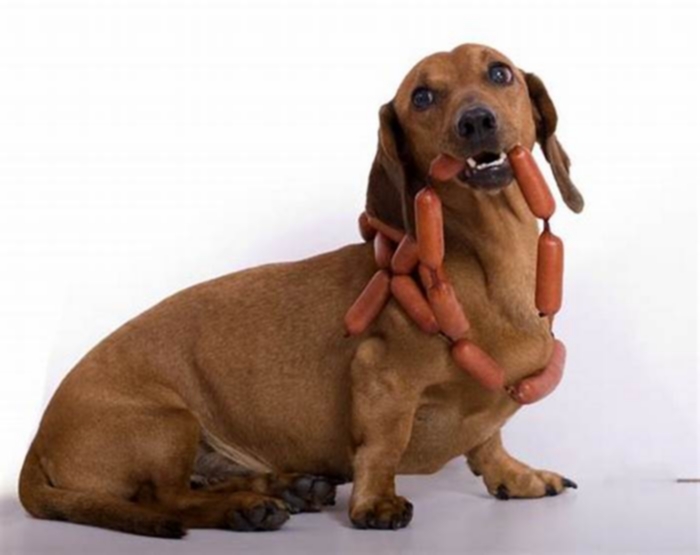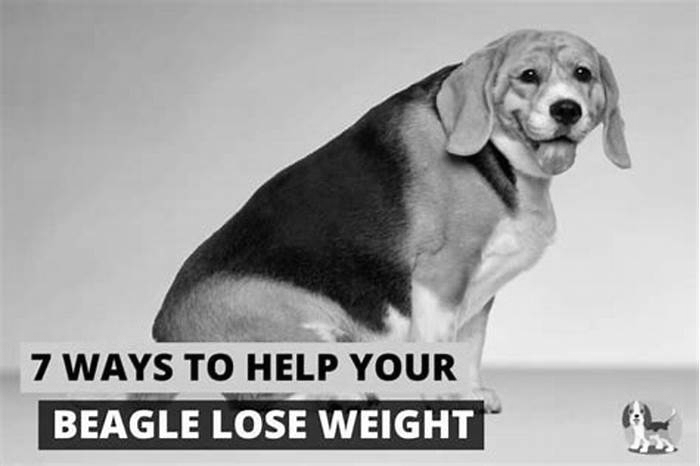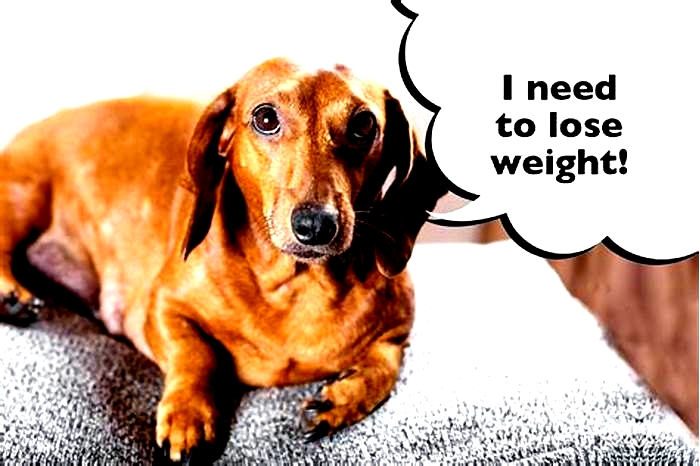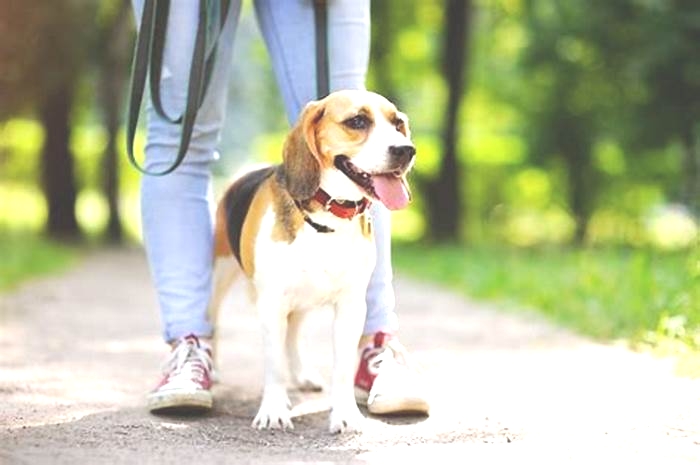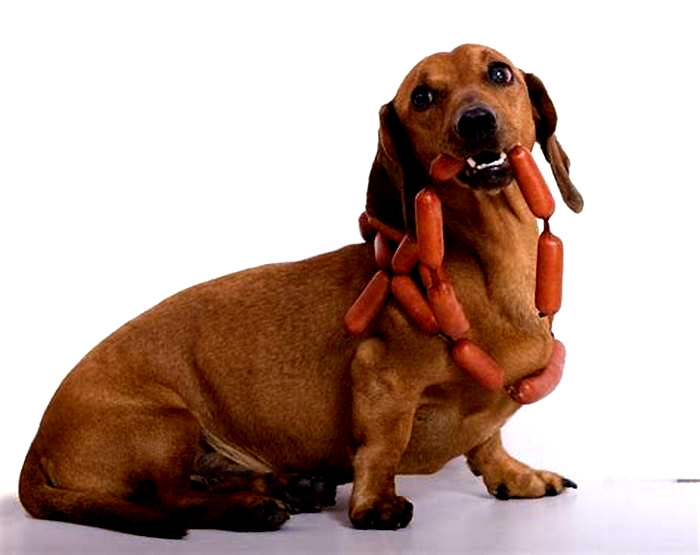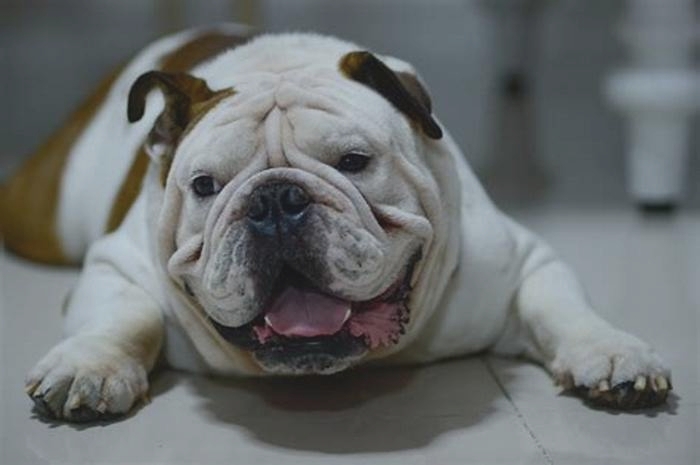Beagle Obesity Tips for Successful Weight Loss

How Can I Help Beagle Lose Weight? 4 Expert Tips
Beagles are adorable dogs with friendly and curious personalities. They are also known for their amazing sense of smell, which makes them excellent hunters and trackers. However, this trait can also lead them to overeat and gain weight, especially if they are not given enough exercise and stimulation. Many people ask me how to help beagle lose weight, so in this article, I will discuss some signs that your beagle may be overweight, some common causes of obesity in beagles, and some tips to help your beagle lose weight and stay fit.
Obesity is a serious health problem for dogs, as it can cause many complications such as joint pain, diabetes, heart disease, and reduced lifespan. Therefore, it is important to help your beagle maintain a healthy weight and prevent obesity.
How to Tell If Your Beagle Is Overweight

It can be hard to tell if your beagle is overweight, as they naturally have a round and chubby appearance. However, there are some ways to check if your beagle is carrying too much fat and needs to lose some pounds.
One way is to use a body condition score chart, which is a tool that helps you assess your beagles body shape and fat distribution. You can find a body condition score chart for dogshere.
According to the chart, a healthy beagle should have:
- A visible waist when viewed from above
- A tucked-up belly when viewed from the side
- Ribs, spine, and hip bones that are easily felt but not seen
- A thin layer of fat covering the body
If your beagle does not meet these criteria, he or she may be overweight or obese. Another way to tell if your beagle is overweight is to weigh him or her regularly and compare the weight to the ideal weight range for beagles.
The ideal weight range for beagles depends on their height, which can be measured from the floor to the top of the shoulder blades.Beagles that are 13 inches or less should weigh less than 20 pounds, while beagles that are 13 to 15 inches should weigh between 20 and 30 pounds.
If your beagles weight is above the ideal range, he or she may need to lose some weight. However, before you start any weight loss program for your beagle, you should consult your veterinarian to rule out any medical conditions that may cause weight gain and to determine the best diet and exercise plan for your beagle.
What Causes Obesity in Beagles?
There are many factors that can contribute to obesity in beagles, but the main cause is usually an imbalance between energy intake and energy expenditure. In other words, your beagle eats more calories than he or she burns.
Some of the reasons why your beagle may eat more calories than he or she needs are:
- Overfeeding: Beagles have a strong appetite and a tendency to beg for food, which can make it hard to resist giving them extra treats or portions. However, overfeeding can lead to weight gain and obesity, as your beagle may consume more calories than he or she can use.
- Lack of exercise: Beagles are active and energetic dogs that need regular exercise to stay healthy and happy. However, if your beagle does not get enough physical activity, he or she may not burn enough calories and may store the excess as fat. Lack of exercise can also lead to boredom and stress, which can make your beagle eat more to cope.
- Age: As beagles get older, their metabolism slows down and their activity level decreases, which means they need fewer calories to maintain their weight. However, if you do not adjust your beagles diet and exercise accordingly, he or she may gain weight as he or she ages.
- Neutering or spaying: Neutering or spaying your beagle can have many benefits, such as preventing unwanted pregnancies, reducing the risk of certain cancers, and improving behavior. However, it can also affect your beagles hormone levels and appetite, which can make him or her more prone to weight gain. Therefore, you may need to reduce your beagles calorie intake and increase his or her exercise after neutering or spaying.
- Medical conditions: Some medical conditions can cause weight gain in beagles, such as hypothyroidism, Cushings disease, or diabetes. These conditions can affect your beagles metabolism, hormone levels, or blood sugar, which can make him or her eat more or burn fewer calories. If you suspect your beagle has a medical condition that causes weight gain, you should consult your veterinarian for diagnosis and treatment.
How to Help Beagle Lose Weight
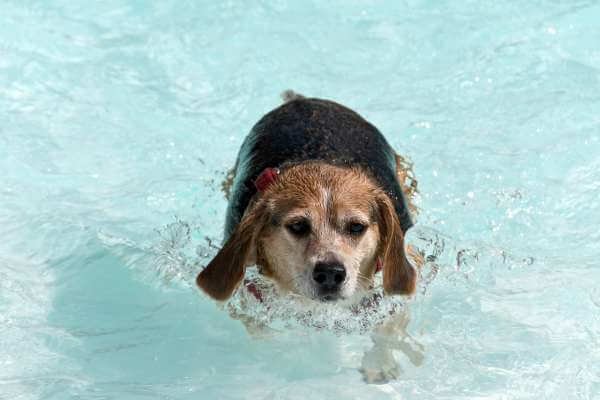
If your beagle is overweight or obese, you should help him or her lose weight to improve his or her health and quality of life. However, you should not put your beagle on a crash diet or a drastic exercise regimen, as this can be harmful and ineffective. Instead, you should follow these tips to help your beagle lose weight safely and gradually:
- Cut back on their food: The first step to help your beagle lose weight is to reduce his or her calorie intake. You can do this by feeding your beagle smaller portions, using a measuring cup or a scale to measure the food, and following the feeding guidelines on the dog food label. You can also switch to a low-calorie or weight-management dog food that is specially formulated for overweight dogs. However, you should not cut your beagles food too much, as this can cause nutritional deficiencies and health problems.You should aim to reduce your beagles food by 10 to 20 percent, depending on his or her weight and activity level.
- Increase exercise: The second step to help your beagle lose weight is to increase his or her physical activity. Exercise can help your beagle burn calories, build muscle, improve mood, and prevent boredom. You can increase your beagles exercise by taking him or her for longer or more frequent walks, playing fetch, tug-of-war, or other games, or even enrolling him or her in a dog sport or agility class.You should aim to exercise your beagle for at least 30 minutes a day, or more if possible.
- Talk to your veterinarian: The third step to help your beagle lose weight is to consult your veterinarian. Your veterinarian can help you determine your beagles ideal weight, body condition score, and calorie needs. He or she can also recommend the best type and amount of food for your beagle, monitor your beagles weight loss progress, and adjust the diet and exercise plan as needed. Your veterinarian can also check your beagle for any medical conditions that may affect his or her weight and treat them accordingly.
- Be patient: The fourth and final step to help your beagle lose weight is to be patient and consistent. Weight loss in dogs is a slow and steady process that requires time and commitment.You should not expect your beagle to lose weight overnight, or to lose more than one to two percent of his or her body weight per week. You should also not give up or get discouraged if your beagle does not lose weight as fast as you hoped, or if he or she plateaus or gains some weight back. You should stick to the diet and exercise plan, reward your beagle with praise and affection instead of food, and celebrate every small achievement.
How do I keep my Beagle skinny?
In addition to cutting down on calorie intake, boosting physical activity plays a crucial role in aiding a Beagles weight loss. Failure to include exercise in a weight loss regimen can significantly delay observable results. Moreover, consistent physical activity is essential for overall well-being and has the potential to extend a Beagles lifespan.
Why is my Beagle getting fat?
Similar to Retrievers and Spaniels bred for work, Beagles also possess a hearty appetite. Once again, this inclination might be attributed to human-driven breeding practices, where dogs motivated by food were preferred for training purposes. This preference has resulted in the Beagle breed being naturally predisposed to greediness and a higher likelihood of overeating.
Why is my Beagle not losing weight?
Every dog is unique, and if your canine companion is not shedding pounds on the prescribed diet, it could indicate a slower calorie burn rate. The daily food allowance might exceed your dogs energy requirements, necessitating further reduction. Before seeking guidance from your vet, ensure that everyone in the household is adhering to the designated diet plan.
Final Thoughts of Help Beagle Lose Weight
Beagles are wonderful dogs that can bring joy and fun to your life. However, they can also become overweight or obese if they eat too much and exercise too little, which can harm their health and happiness. Therefore, it is important to help your beagle maintain a healthy weight and prevent obesity.
By following the tips in this article, you can help beagle lose weight safely and gradually, and improve his or her well-being. Remember to consult your veterinarian before starting any weight loss program for your beagle, and to monitor your beagles weight and body condition regularly. With your love and support, your beagle can achieve his or her weight loss goals and enjoy a longer and happier life with you.
How to Get Beagle to Lose Weight: Effective Tips and Strategies
Are you worried about your adorable Beagles expanding waistline? If those extra pounds are making you howl with concern, fear not! Lets embark on this journey to a healthier and happier Beagle together: How to Get Beagle to Lose Weight.
We understand the importance of helping your Beagle shed those unwanted pounds and achieve their ideal weight. In this comprehensive guide, we will reveal effective strategies and tips to facilitate successful weight loss for Beagles. With our paw-some game plan, your furry friend will become the lean, energetic Beagle they were meant to be, bounding back to optimal health in no time.
DogCareLand
So, grab a treat for yourself and embark on an exciting journey to help your beloved Begal become the slim and trim superstar they were born to be!
Why is it Important to Help Your Beagle Lose Weight?
It is important to help your Beagle lose weight for several reasons:
- Health Concerns: Obesity in Beagles can lead to various health problems, including diabetes, heart disease, joint issues, and respiratory problems. Helping your Beagle maintain a healthy weight can reduce the risk of these conditions & promote overall well-being.
- Increased Lifespan: Beagles that are overweight tend to have shorter lifespans than those who maintain a healthy weight. By helping your Beagle shed excess pounds, you can extend its lifespan and enjoy more quality time together.
- Improved Mobility: Carrying excess weight strains your Beagles joints, making it difficult for them to move comfortably. By helping them lose weight, you can alleviate this strain and improve their mobility, allowing them to engage in physical activities more easily.
- Enhanced energy Levels: Being overweight can lead to lethargy and reduced energy levels in Beagles. Helping your Beagle achieve a healthy weight can increase their energy levels and promote a more active lifestyle, which is essential for their happiness and mental stimulation.
9 Top Ways: How to Help a Beagle Lose Weight
Top Ways to Help a Beagle Lose Weight
(I) Exercise
Engage your Beagle in physical activities such as brisk walks, jogging, or playing fetch. Gradually increase the duration & intensity of exercise to help burn calories and improve fitness.
(II) Start Measuring Calories
One of the first steps to help your Beagle lose weight is to measure their daily caloric intake. Consult your veterinarian to determine the appropriate calorie range for your dogs size, age, and activity level. Moreover, use a measuring kitchen scale to portion their food accurately.
(III) Make Changes in Diet
Evaluate your Beagles diet and make necessary adjustments to promote weight loss. Opt for a high-quality, balanced dog food specifically formulated for weight management. Avoid free-feeding and instead establish set meal times to control portion sizes.
(IV) Help Your Dog Move More
Regular exercise is crucial for weight loss. Increase your Beagles daily physical activity gradually. Start with shorter walks & gradually increase the duration and intensity. Moreover, consider activities like playing fetch or agility training, which can mentally and physically engage your Beagle.
(V) Provide Extra Play Time
Beagles are active and playful dogs. Encourage more playtime to burn additional calories. Engage them in interactive games, such as hiding treats or toys for them to search, stimulating their mind and keeping them physically active.
(VI) Use Vegetables as Treats
Instead of calorie-dense treats, offer your beagle low-calorie alternatives. Vegetables like carrots, green beans, or cucumber slices make excellent treats that are low in calories and fiber. They can be used as rewards during training sessions or as occasional snacks.
(VII) Cut Down Carbohydrates
Reducing the amount of carbohydrates in your Beagles diet can aid in weight loss. Choose dog foods with lower carbohydrate content and focus on providing more protein and healthy fats. Therefore, consult your veterinarian for appropriate diet recommendations.
(VIII) Prefer High Protein Diet Food
Feeding your Beagle a diet rich in lean proteins can help support weight loss. Protein keeps them feeling fuller for longer, reducing the urge to overeat. Look for dog food formulas with high-quality protein sources, such as chicken, turkey, or fish.
(IX) Feed Many Small Meals
Instead of feeding your Beagle one or two large meals, consider dividing their daily food allowance into multiple smaller meals. This approach can help prevent overeating and keep their metabolism active throughout the day.
Curious: Beagle Overweight Causes
Beagles are small to medium-sized breeds known for their friendly and outgoing nature. However, like any dog, they can become overweight if not properly managed. Several factors can contribute to a beagle becoming overweight:
- Overfeeding: One of the primary causes of Beagle overweight is overfeeding. Beagles tend to eat more than they need, especially if given unlimited access to food. They have a keen sense of smell and a strong food drive, which can lead to overeating if not controlled.
- Lack of portion control: In addition to overfeeding, inadequate portion control can also contribute to beagle obesity. Beagles should be fed according to their age, size, and activity level. Moreover, providing too much food at each meal or not measuring portions accurately can result in excessive calorie intake.
- Lack of exercise: Beagles are an active breed that requires regular exercise to maintain a healthy weight. An inactive lifestyle or lack of physical activity can lead to weight gain. Beagles should be given opportunities for daily walks, playtime, and mentally stimulating activities to help burn off calories.
- Treats and table scraps: Beagles are fond of food; excessive treats or table scraps can quickly contribute to weight gain. Many commercial treats are high in calories and can add up if given too frequently. Choosing low-calorie treats or using small pieces of healthy food as rewards during training is important.
- Neutering/spaying: Neutering or spaying your Beagle can alter its metabolism, leading to a decreased energy requirement. If the caloric intake is not adjusted accordingly, it can result in weight gain. Its important to consult your veterinarian to determine the appropriate diet and feeding plan for a spayed or neutered beagle.
Risks of Canine Obesity
Canine obesity, or excessive weight gain in dogs, is a growing concern among pet owners and veterinarians. While spoiling our furry friends with extra treats and indulgent meals may be tempting, its important to recognize the risks associated with canine obesity. Here are some of the key risks:
- Reduced Life Expectancy: Obese dogs are prone to a shorter lifespan than their healthy-weight counterparts. Studies have shown that obese dogs are likely to develop chronic health conditions that can significantly impact their quality of life and longevity.
- Joint and Mobility Issues: The additional weight strains a dogs joints, leading to arthritis and hip dysplasia. These conditions can cause pain, discomfort, and reduced mobility, making it difficult for dogs to enjoy physical activities and exercise.
- Increased Risk of Chronic Diseases: Obesity in dogs is related to a rising risk of developing multiple chronic health conditions, including diabetes, high blood pressure, heart disease, respiratory problems, and certain types of cancer. These conditions can be life-threatening and require long-term management.
- Heat Intolerance: Overweight dogs struggle with regulating their body temperature, particularly in hot weather. They are at a higher risk of heatstroke and other heat-related conditions due to the additional insulation from the fat, which inhibits efficient cooling through panting.
- Emotional and Behavioral Issues: Canine obesity can have psychological implications for dogs, leading to decreased self-esteem, depression, anxiety, and aggression. The social and emotional well-being of the dog can be negatively affected, impacting their overall quality of life.
Causes of Obesity in Dogs
Several factors can contribute to obesity in dogs. Here are some common causes:
Poor Diet
Feeding your dog a diet high in calories, unhealthy fats, and carbohydrates can contribute to obesity. Low-quality commercial dog foods or excessive table scraps can lead to weight gain. Feeding your dog a balanced & nutritious diet is important to maintain a healthy weight.
Breed Predisposition
Certain dog breeds are prone to weight gain and obesity. Breeds such as Labrador Retrievers, Beagles, and Cocker Spaniels are known to have a higher risk of obesity. Its important to be mindful of the specific needs of your dogs breed and adjust their diet and exercise accordingly.
Age
Older dogs have a slower metabolism and decreased activity levels, making them more susceptible to weight gain. As dogs age, their calorie requirements decrease, and if their diet isnt adjusted accordingly, they can gain weight.
Medical Conditions
Specific medical conditions can lead to weight gain in dogs. Hypothyroidism, Cushings disease, and insulin resistance can contribute to obesity. If you doubt a medical condition is causing your dogs weight gain, its important to consult with a veterinarian.
Feeding Habits and Environment
Inconsistent feeding schedules, leaving food out all day, or free-feeding can contribute to overeating and weight gain in dogs. Additionally, an environment with multiple pets where one dog monopolizes the food can result in weight gain in the less dominant dog.
How Can I Get My Cute Beagle to Lose Weight?
To help your adorable Beagle shed those extra pounds, heres a paw-some plan:
- Get moving: Schedule regular exercise sessions for your Beagle. Engage in activities like brisk walks, jogs, or even fun games of fetch. Moreover, make exercise enjoyable for both of you!
- Treat wisely: Treats are great for training, but opt for healthier options like low-fat, grain-free treats or small pieces of fresh fruits & vegetables. Remember, moderation is key!
- Slow & steady wins the race: Gradually reduce the portion sizes rather than making sudden changes. This allows your Beagles body to adjust without feeling deprived.
- Toy time: Keep your Beagle mentally stimulated with interactive toys like treat puzzles or Kong toys stuffed with healthy snacks. However, this can distract them from overeating and provide an entertaining workout for their jaws!
- Regular check-ups: Schedule regular visits with your veterinarian to monitor your Beagles progress and adjust the weight loss plan if needed. Moreover, they can give valuable guidance & support throughout the journey.
Wrap Up
In conclusion, helping your Beagle lose weight is a worthwhile endeavor that requires dedication, patience, and a well-rounded approach. You can set your furry friend on a healthier and happier life by implementing a balanced diet, providing regular exercise, and ensuring mental stimulation. Remember, a slimmer beagle is a happier beagle, so lets embrace this journey together and watch those pounds melt away. Heres to a long and active life filled with tail wags and slobbery kisses!

